[Editor’s note: Anne Cameron, the feisty, award-winning B.C. author, died on Nov. 30. The website of her longtime publisher, Harbour, aptly describes her as “easily one of the province’s most groundbreaking writers” in a posted tribute. We are proud that Cameron was a regular Tyee reader and commenter. She often shared her no-nonsense love of justice, family and independent thought with our community. Republished here is a piece arising from a visit with Cameron in her Vancouver Island town of Tahsis, published on The Tyee on May 8, 2020.]
The route from Gold River to Tahsis, on the northwest coast of Vancouver Island, is a steep, winding “goat track,” in the words of one local. But eventually, the road stops fighting, slumps and runs parallel with the small inlet that shares the village’s name. I arrived at twilight, the water, mountains and sprinkle of buildings barely lit. I had been advised to bring my own coffee cream because you can never be sure if what’s found in town is “this year’s version, or some previous year’s.”
About 300 people live in Tahsis, and one of them is noted author Anne Cameron. In 2002, an interviewer asked Cameron what the aspirations of British Columbians were. She answered: “I think our main aspiration is to be left alone.” Cameron, who is 81, lives in a trailer home with her teenage granddaughter, a duo of dogs she calls the Pug Brigade, and Brat-Cat the cat. There, she grows pussy willows and tries to figure out whether her latest novel — which would be her first book published in 16 years — is done or not.
And sometimes, when she feels like being with others (at least digitally), she pops up in the comments sections of stories that appear in The Tyee, sharing her tough-minded, wise-cracking perspectives on what’s wrong with the world and right about life in Tahsis.
Cameron holds an esteemed place in B.C. literature. In 2010, she won the George Woodcock Lifetime Achievement Award, an honour she shares with, among others, Joy Kogawa and Alice Munro. She received the recognition for her more than 30 books of adult fiction, poetry and children’s stories.
Cameron said that others had preceded me in visiting her in Tahsis, “shiny-eyed” fans who hoped she’d tell them “something timeless and wise.” One woman recently made the trip up from Washington state to ask whether she should continue her master’s degree or give it up and find a job. (Cameron told her to keep at it.)
It was a dreary November afternoon — the kind that feels like it's raining even if it’s not — when Cameron greeted me at her door. She wore tie-dye, denim and big round glasses that magnified her sharp, turquoise eyes. In a home packed with Indigenous art, she poured me tea that she later joked might be poisoned. As she smoked hand-rolled cigarettes, she offered her perspectives on many things, including, from her vantage on the other side of the goat track, the City of Vancouver. Its mayor, Kennedy Stewart, is “a great big bowl of blancmange.” Its nighttime buzz is cautionary. “There was just one light after another light, building after building, three o'clock in the morning,” she said, describing her last visit. “All of the lights were on cars passing this way, cars going that way. And the sound in the middle of the night. The sound coming up from the city is like a huge critter, an animal, the beast breathing.”
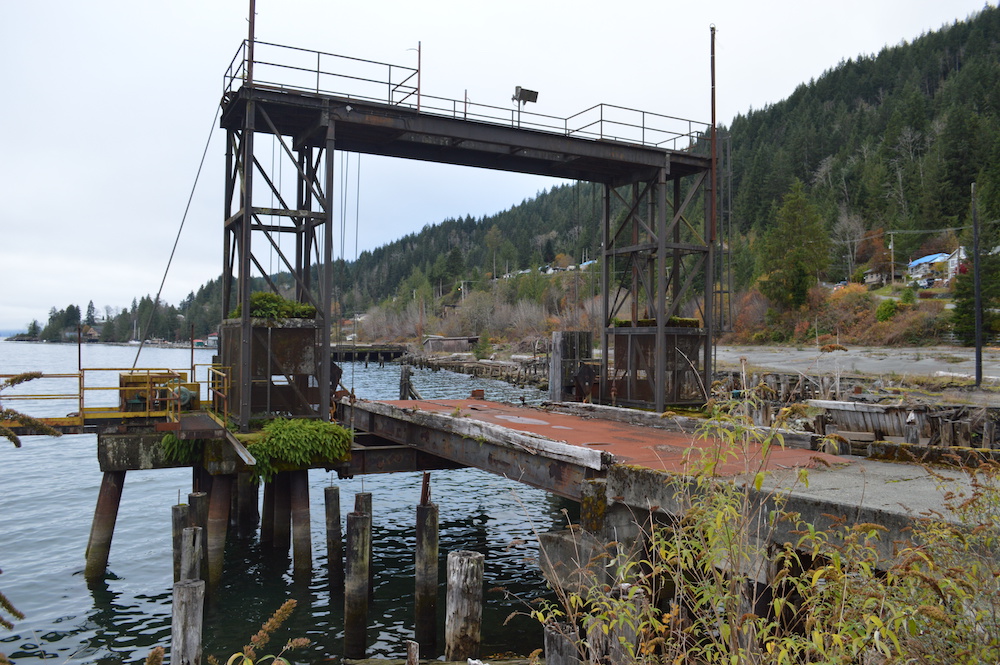
Daughters of Copper Woman, published in 1981, is Cameron’s most celebrated book and a continued source of controversy. In it, she offers a collection of stories she says Nuu-chah-nulth Elders told her about the pivotal role women played in pre-contact times, as well as the secret matriarchal society that sustained that precious knowledge. In the early 1980s, the book struck a chord with North America’s burgeoning feminist movement. One university professor of mine called the book a revelation, saying it opened her settler eyes for the first time to Indigenous culture.
In 1986, Cameron published Dzelarhons: Mythology of the Northwest Coast, a book featuring Haida storytelling. Two years later, at a Montreal literary conference, Lee Maracle, a Sto:lo poet and author, reportedly asked Cameron to “move over” and make way for Indigenous writers. Maracle later denied asking Cameron to move out of the way. Instead, she said she asked her to “stop stealing our stories.” An English professor on Vancouver Island told me to this day some of her students refuse to read Cameron’s work.
In the 2002 preface to Daughters, Cameron writes that Elder women of the Nuu-chah-nulth Nations, from the west coast of Vancouver Island, instructed her “to put the stories on paper and have them published, for all of our children and grandchildren, but especially for the ones who have been deprived of some of the healing aspects of their grandmothers’ culture.” That explanation did not satisfy Maracle, who Cameron calls a longtime friend.
“What our Elders did not know, and I know no white person has ever explained to them, is that once you give away the story, that is it, your children are disinherited,” Maracle wrote in her 2017 book My Conversations With Canadians. “Some Elders don’t mind that but some do, and that should have alerted the white writer to something being wrong here. Who would give away their children’s inheritance if they were aware that that is what they were doing?”
I reached out to Maracle for comment, but she declined an interview.
After the confrontation in 1988, Cameron says she respected Maracle’s request. “I understood her point of view.” Since then, she hasn’t released a work of adult fiction inspired by Indigenous legends, although she has published several children’s books based on Indigenous legends, including a 1998 collaboration with Sue Pielle, an Elder storyteller from the Tla'amin Nation on the upper Sunshine Coast.
When I first met Cameron at her home in Tahsis, she emphasized the importance of receiving consent to tell the stories Indigenous Elders have shared with her. “I’ve been very lucky. I’ve had people tell me some absolutely incredible stories, but I haven't been given the permission to pass [some of those] stories on. Stories and songs and dances and poems are the personal possession of the people who are telling them. They’re not yours to tell.”
Still, Cameron said “at least half” of the characters in her books are First Nations people. “I just don't say so. You know, they live among us, eh?” she said sarcastically.
There’s an added layer of fierce humour to that statement. Most of Cameron’s grandchildren are Indigenous, including the granddaughter who lives with her now. Of her grandkids, Cameron said, “Being First Nations is not the be-all, end-all and final descriptor of who they are any more than me being primarily Scottish defines who I am.”
When Cameron was 20, she met a French-Canadian pilot. Soon after they married; then three children arrived. They stayed together for more than a decade and a half. When it was over, Cameron made sure she got custody of the kids and, like so many of the resourceful women in her stories, she scraped by. “We ate a lot of macaroni.” Eventually, she sold a screenplay to CBC in the mid-1970s and then came the books and more scripts and film and literary awards. She never kissed a man again.
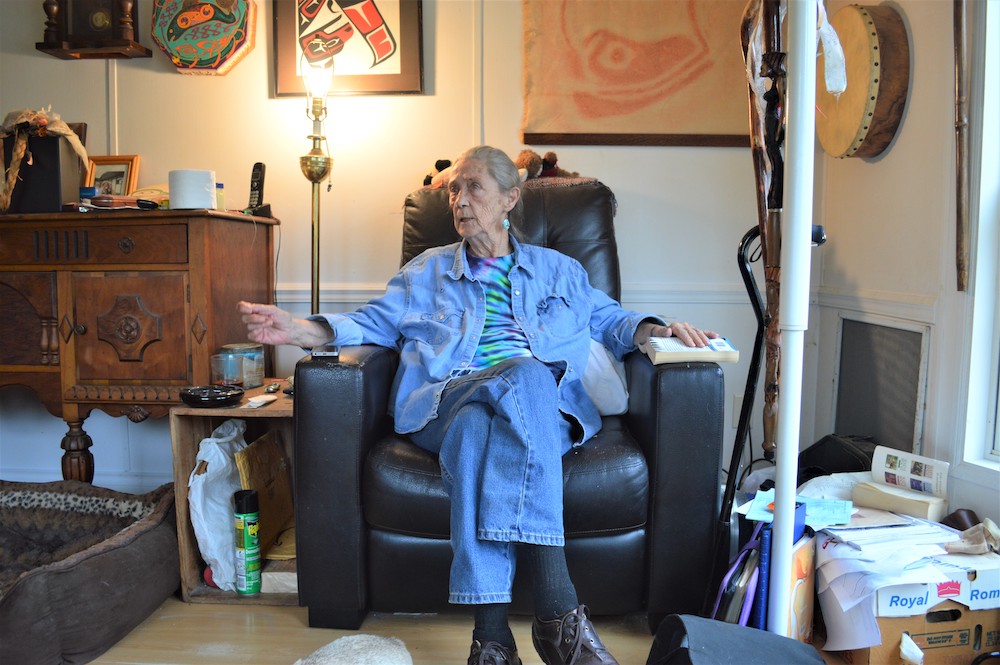
According to BC Stats, Tahsis was the second-fastest growing community in the province in 2019, swelling by just under nine per cent. That means an additional 24 newcomers showed up. Buildings along the shoreline sit empty and boarded up. But, a few decades ago, when the sawmills were at their peak, nearly 2,500 folks lived here. In a 2005 dispatch for The Tyee, Cameron described it this way: “It was boom time then, three mills going around the clock, the noise rose from the machines and echoed off the bluffs, back and forth across the valley until I felt as if it was all happening behind my eyes, filling my head with rhythmic pounding.”
After that last mill in Tahsis shut down about 20 years ago, the log booms that once crowded the inlet disappeared along with roughly 85 per cent of the population. The port now sits fenced off and quiet. Tahsis is trying to reinvent itself as an ecotourism destination for summer travellers seeking to fish, kayak, hike and explore caves.
Up and down the coasts of Vancouver Island, other mill towns have suffered similar fates: Gold River, Youbou, Bamfield, Jordan River, Holberg. Dr. John Lutz, a historian at the University of Victoria, keeps track of the decline. He says fewer people live on the west coast of Vancouver Island today than did a century ago. "I mean, capitalism does this, right? At least resource capitalism,” he told me. “It has no sense of attachment to the place and very little to the people. It just has an attachment to the extraction of wealth.”
Cameron knows this truth well. She was born into a family of coal miners in Nanaimo and moved to Tahsis… well, she doesn’t really remember exactly when. (“You keep asking me, ‘What year was this? And what year was that?’ And I will be damned if I know.”) The stories she’s written are full of loggers, tree planters and the sturdy women that so often hold these towns together. “I don't think anyone has captured the idiom of the working-class, B.C., coastal small community as well as she has,” Howard White, Cameron’s longtime publisher, said to me. “I sort of think of her as the William Faulkner of the B.C. coast.”
Here’s an old joke Cameron likes to tell: “God must love poor people because she made so many of them.” She laughed. “And that's true of workers.” She refuses, though, to wax sentimental about workers clinging to jobs in the struggling oil and gas industry. She thinks energy companies have duped some into thinking that nothing else exists for them beyond fossil fuel extraction. “When they scream and yell to protect the jobs they presently have, they don't seem to realize that they are at the same time admitting they're too fucking stupid to learn how to do something else,” she said.
“Not all that long ago,” she told me, “there was a really good job going around the village at night lighting lamps, but we don't have any lamplighters working today, and nobody misses it. Who misses the guys who steered the 20-mule teams that took the Borax across, you know, Death Valley? Nobody's worrying about their jobs. Jobs come, and jobs go.”
Listen carefully to Cameron’s profane lectures and the deeper empathy surfaces. She speaks hard truths about what it means to be working class in Canada today, while directing her anger at those who reap the profits.
“When I was still young, back when the dinosaurs roamed the Earth, we all just knew, the way we knew the tide comes in and the tide goes out, we knew we were going to get a job, we were going to save some money, and we were going to buy our own house, or build our own house.”
“My grandchildren,” Cameron said. “They might inherit this trailer, but they will never be in a position of buying one themselves.”
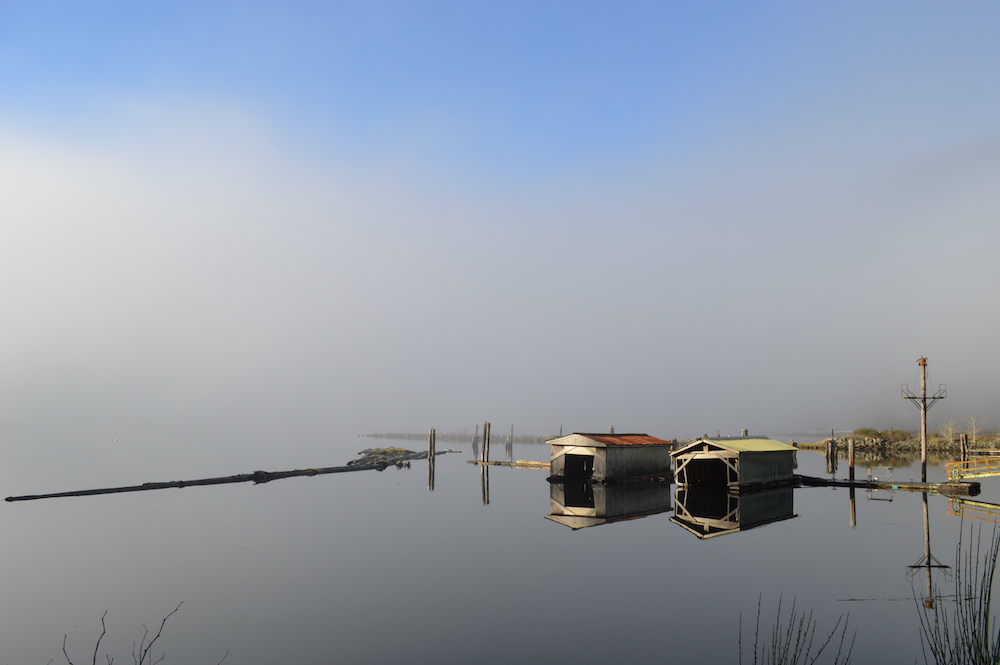
Well into spring, low-hanging fog off the mountains makes it feel like Tahsis is fully insulated from the world's chaos. But Cameron won’t avert her eyes. She’s a keen follower of the news. A few months after visiting Tahsis, I gave her a call. At the time, Canada was gripped by nationwide protests in support of the Wet’suwet’en Hereditary Chiefs’ demand that no pipeline be built without recognizing their people’s title to the land it would cross, and their right to say no. The stand-off in northern B.C. had rippled out, and Indigenous people and allies were blocking trains not just in B.C. but in Ontario and Quebec. The country’s social fabric, let alone any earnest effort at reconciliation, felt like it could unravel.
As usual, Cameron didn’t mince her words. “How many times do people have to be kicked in the head before something happens, like a blockade on the railway?”
“Both the province and the federal government have been saying things and then not backing it up at all,” Cameron continued. And then she referenced another obstacle the federal government had recently created for members of First Nations. It was fighting a $6-billion class-action lawsuit that demanded the government compensate First Nations children who were denied adequate health services or were otherwise suffering as a result of Canada’s underfunded on-reserve child welfare system.
“I mean who the hell in their right mind is going to be talking reconciliation while taking Native children to court to try to cut down the amount of settlement that had been decided on? Now, what kind of cheap shit is that? I don't see how you can call it reconciliation when there was never any conciliation to begin with.”
Cameron concluded that the pipeline protests and rail blockades were “just one manifestation of a really, really deep-rooted anger. You can't keep pushing people around and expect them to just keep smiling.” Canadians are “very lucky,” she said, that Indigenous people in this country “are as patient as they are.”
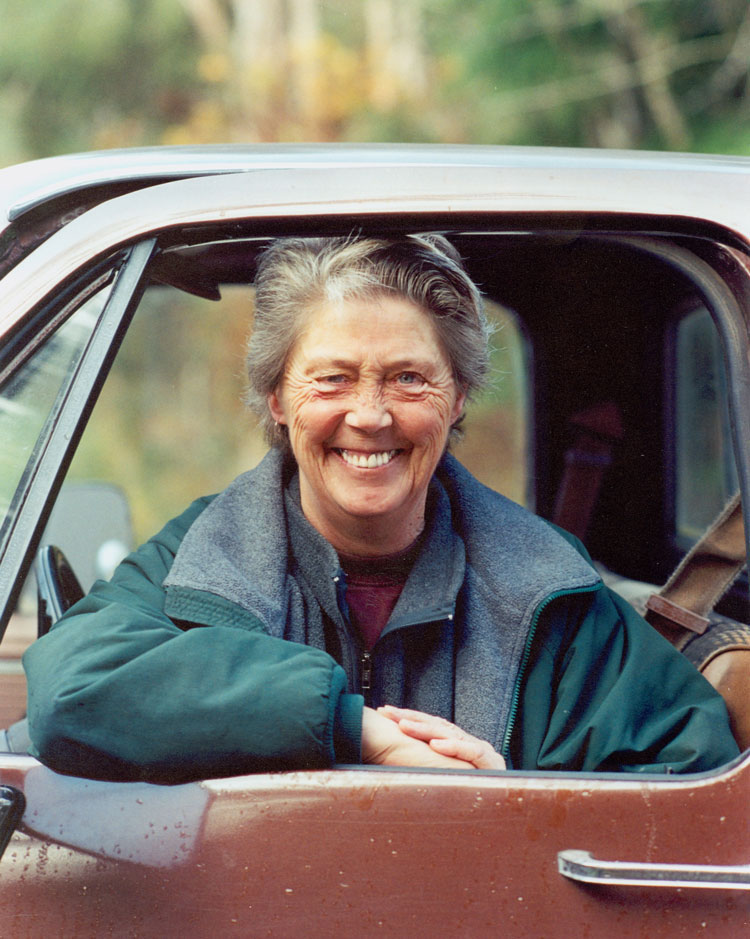
Two years after her divorce, in or about the early 1970s, Cameron fell in love with a woman from B.C.’s mainland. They got together after Cameron figured out what she was feeling inside. “I was quite puzzled for a while,” she recalled. “It's not like suddenly, in flaming letters across the sky, the finger of God drew a message to me.”
When Cameron was around 13, her mother Annie became a Jehovah’s Witness and began dragging her to the local Kingdom Hall. Her brother never had to go, but Cameron’s two sisters remain members of the church, as do their children. For Cameron, “It never took.”
Cameron and her mother never discussed her sexuality, but she’s sure her mom knew. Did it change their relationship? “No,” she cackled. “She had disapproved of me for a long time.” She elaborated. “It was a strange relationship with my mom because I knew — the way I knew the sun rises, and the moon shines in the sky, and the tide comes in, and the tide goes out — I knew my mother loved me. But I don't think she liked me.”
Over the phone, I could hear the claws of the Pug Brigade tap along the linoleum floor of Cameron’s home. It was five o’clock, the dogs’ dinner time. “Honest to God, they have alarm clocks in their heads,” she moaned, imagining out loud the dogs’ thoughts. “’What if she forgot tonight? What if she's forgotten? What if she's forgotten?'
“And they keep it up, and the little toenails go ticky-ticky-ticky-ticky-ticky. It can drive a sane person mad. I'm insane, so it doesn't bother me.”
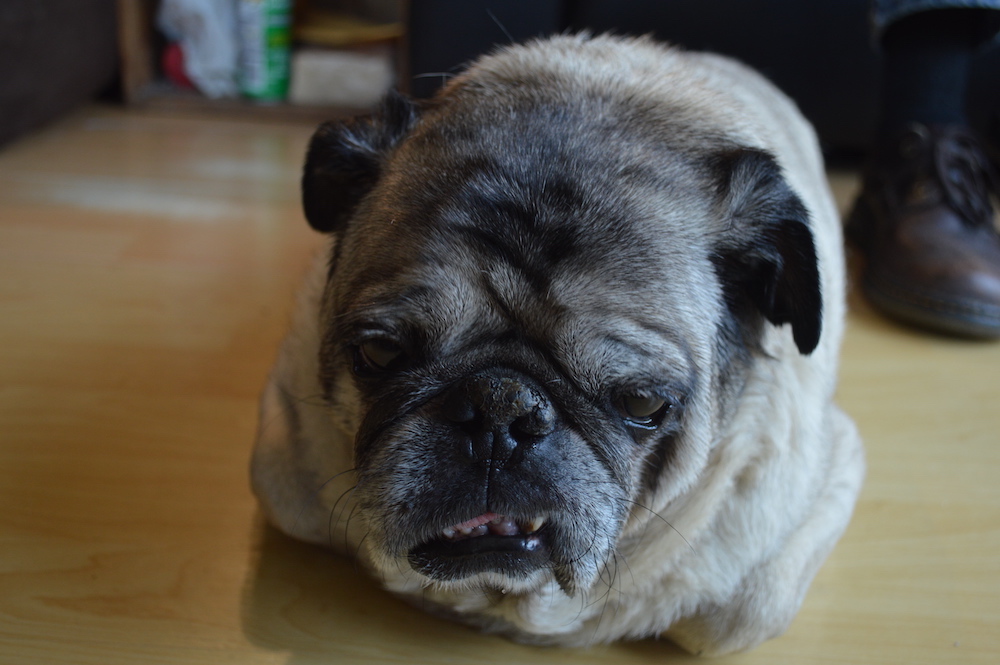
Cameron served for a time on the municipal council of Tahsis. She took it upon herself to file memos on the goings-on around town. Mayor Martin Davis, who served on council with Cameron, said they often read like novellas. He recalled one about the so-called “crow wars” dividing residents of the trailer park where Cameron lives. Half of the residents were feeding the crows, encouraging them to flock to the trailer park. The birds would peck on the metal roofs of the homes in hopes of being fed. This, naturally, irritated the other half of the residents, some of whom, according to Davis, “were actually trying to shoot the crows.” Whose side was Cameron on? “She was pro-crow,” Davis said with a laugh.
I asked Cameron how she expects to be remembered. Predictably, she demurred. “I'm not sure that I'll be remembered. I don't think we should make a big point of remembering anybody. We should maybe just put all our energy into making things better for the next bunch ‘cause God knows the world is fucked, Ben.”
But Cameron doesn’t think Tahsis is fucked, and that’s why she’s stayed.
“I really like it here,” she said the last time we spoke, after the coronavirus had arrived in Canada, intruding even on life where the road runs out at the far western edge of the country. “I’ve got a few good friends who do things like come to the door with a quart of delicious, homemade stew and just pass it through and say, 'I'm not coming in because if you're not contagious, I probably am. I hope this stamps your appetite. You take care of yourself, and if you need anything, phone me.’
“That's why I live in Tahsis. ‘Cause I'm not sure that that would happen in North Vancouver.”
Actually, I said, that sort of thing did seem to be happening in the big city in response to the pandemic.
“Might be doing us a favour,” she joked.
I told her about the posters people have put up around Vancouver offering to deliver groceries to elderly people in self-isolation.
“It would be nice if that turned into business as usual when the panic is over,” she said.
Then she told me she had to get off the phone. The “fire-breathing dragon” who lives in her back was acting up again. “Look after yourself, Ben, and phone your mom.” ![]()
Read more: Media


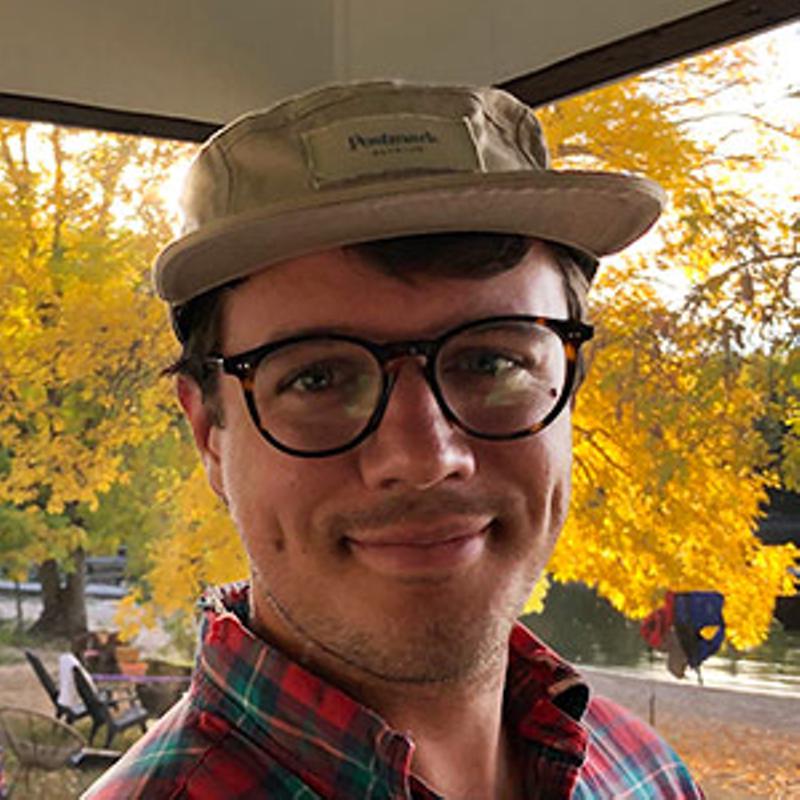

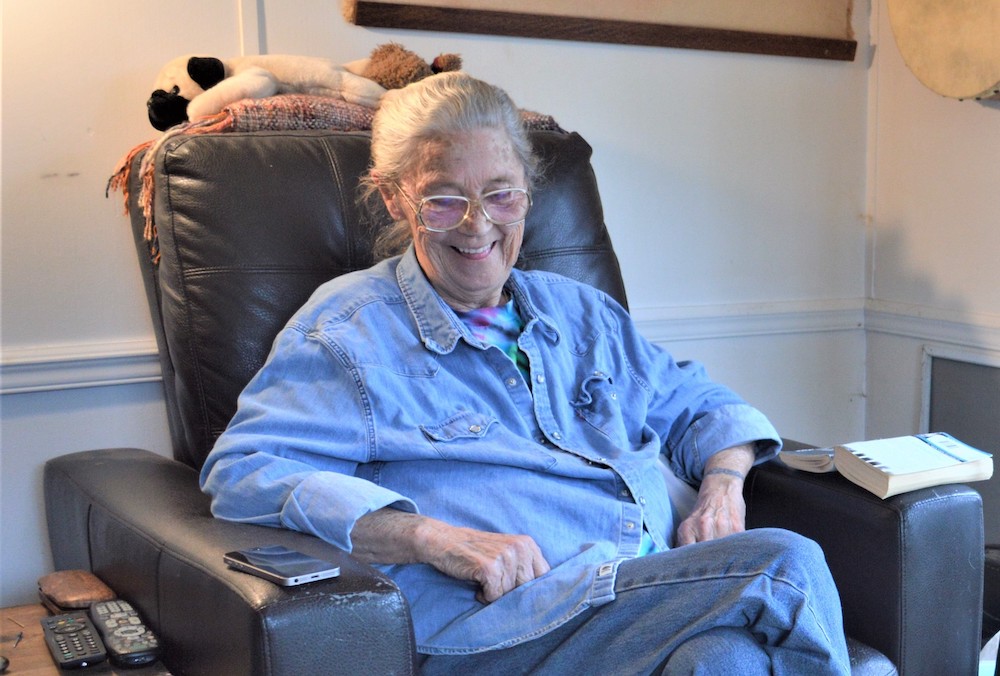












Tyee Commenting Guidelines
Comments that violate guidelines risk being deleted, and violations may result in a temporary or permanent user ban. Maintain the spirit of good conversation to stay in the discussion.
*Please note The Tyee is not a forum for spreading misinformation about COVID-19, denying its existence or minimizing its risk to public health.
Do:
Do not: